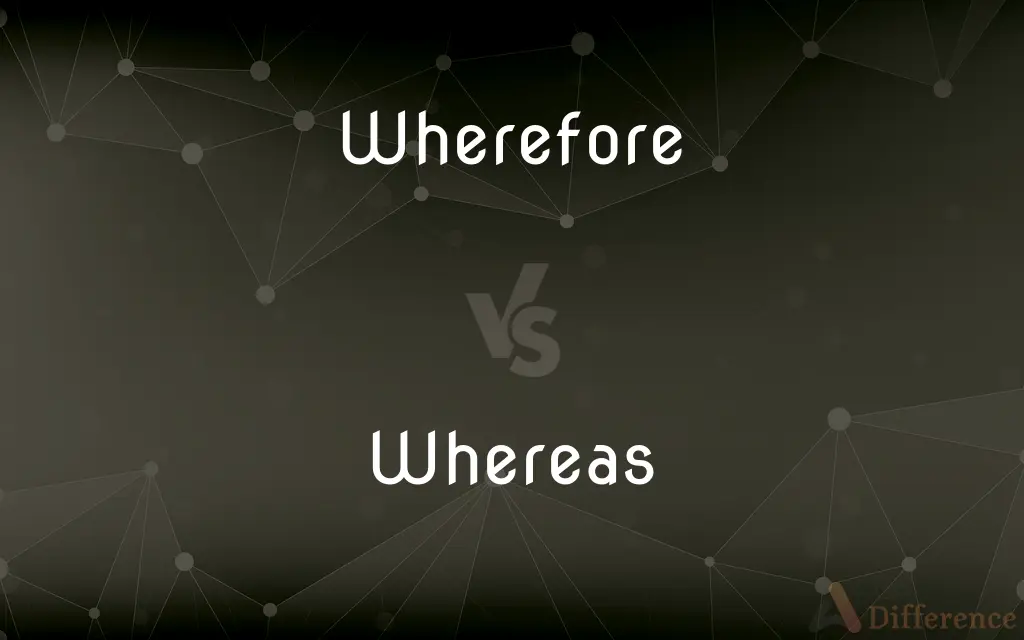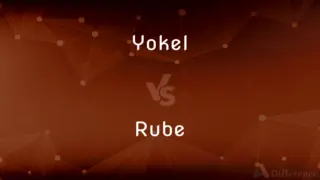Wherefore vs. Whereas — What's the Difference?
By Fiza Rafique & Urooj Arif — Updated on April 29, 2024
"Wherefore" means "why" or "for what reason," used in literary and formal contexts, while "whereas" is used to contrast clauses or facts in legal and formal writing.

Difference Between Wherefore and Whereas
Table of Contents
ADVERTISEMENT
Key Differences
"Wherefore" is an archaic term that translates to "why" or "for what reason," often found in older texts or used for dramatic or literary effect. Whereas, "whereas" serves as a conjunction used to introduce a contrast between two facts or statements, typically seen in legal, formal, or written discourse.
In famous literary works, such as Shakespeare's "Romeo and Juliet," the term "wherefore" is used in the iconic line "Wherefore art thou Romeo?" to question the reason behind Romeo's name, not his location. On the other hand, "whereas" is frequently found at the beginning of legal documents to delineate differing circumstances or conditions, such as "Whereas the first party agrees to sell... whereas the second party agrees to buy...".
While "wherefore" has largely fallen out of common usage except in specific scholarly or artistic contexts, "whereas" continues to be used in formal agreements, resolutions, and comparisons to emphasize differences.
Both terms, however, contribute to the richness and precision of English, illustrating the language's capacity for expressing detailed legal and philosophical concepts.
Comparison Chart
Definition
Why or for what reason
A conjunction used to contrast statements
ADVERTISEMENT
Usage
Archaic, used in literary contexts
Common in legal and formal writing
Example Context
Literary works, formal speeches
Legal documents, formal agreements
Modern Relevance
Limited, mostly literary or artistic
Widely used in legal and formal contexts
Connotation
Inquisitive, seeking reasons
Contrasting, delineating differences
Compare with Definitions
Wherefore
Used in historical texts.
Historical documents often query, Wherefore was the battle fought?
Whereas
Used in resolutions and declarations.
The resolution states, Whereas conditions have improved, further action is required.
Wherefore
Inquires the reason behind something.
Wherefore do we follow these outdated practices?
Whereas
Introduces a contrast in formal writing.
He enjoys soccer, whereas his brother prefers basketball.
Wherefore
Indicates the cause of an event.
He questioned, Wherefore was this decision made?
Whereas
Begins clauses in legal documents.
Whereas the first section is agreed upon, the following remains in dispute.
Wherefore
Philosophical questioning.
Philosophers debate, Wherefore exists the universe?
Whereas
Separates differing facts or opinions.
Some see it as beneficial, whereas others view it as detrimental.
Wherefore
Literary term for understanding motives.
The poet asks, Wherefore love if to part?
Whereas
Specifies conditions in contracts.
The contract stipulates, Whereas Party A delivers goods, Party B will make payment.
Wherefore
For what purpose or reason; why.
Whereas
It being the fact that; inasmuch as.
Wherefore
Therefore.
Whereas
While at the same time.
Wherefore
A purpose or cause
Wanted to know all the whys and wherefores.
Whereas
While on the contrary.
Wherefore
Why, for what reason, because of what.
Whereas
An introductory statement to a formal document; a preamble.
Wherefore
Therefore.
Whereas
A conditional statement.
Wherefore
(archaic) Because of which.
Whereas
(obsolete) Where (that).
Wherefore
An intent or purpose; a why.
Whereas
In contrast; whilst on the contrary; although.
He came first in the race, whereas his brother came last.
Wherefore
For which reason; so; - used relatively.
Wherefore by their fruits ye shall know them.
Whereas
It being the fact that; inasmuch as. (Often used to begin recitals; sometimes emboldened or emphasized as a signifier.)
Wherefore
For what reason; why; - used interrogatively.
But wherefore that I tell my tale.
Wherefore didst thou doubt?
Whereas
A clause, as in legal documents, stating whereas.
Wherefore
The reason why.
Whereas
At which place; where.
At last they came whereas that lady bode.
Wherefore
The cause or intention underlying an action or situation, especially in the phrase `the whys and wherefores'
Whereas
Considering that; it being the case that; since; - used to introduce a preamble which is the basis of declarations, affirmations, commands, requests, or like, that follow.
Wherefore
For which reason;
Wherefore do I receive this honor?
Whereas
When in fact; while on the contrary; the case being in truth that; although; - implying opposition to something that precedes; or implying recognition of facts, sometimes followed by a different statement, and sometimes by inferences or something consequent.
Are not those found to be the greatest zealots who are most notoriously ignorant? whereas true zeal should always begin with true knowledge.
Common Curiosities
Can "wherefore" and "whereas" be used interchangeably?
No, "wherefore" asks for reasons, whereas "whereas" introduces contrasts.
How does "whereas" function in a legal document?
In legal documents, "whereas" introduces preambles or conditions that set the stage for the stipulations that follow.
Why might someone use "wherefore" in modern writing?
Using "wherefore" can add a classical or formal tone to writing, appealing to literary traditions.
Are there modern alternatives to using "wherefore"?
Today, "why" or "for what reason" are commonly used instead of "wherefore."
What are some common mistakes when using "whereas"?
A common mistake is using "whereas" simply as a filler without presenting a clear contrast or reason.
What is the significance of "whereas" in agreement clauses?
"Whereas" is crucial for outlining the context and contrasting points within agreements, ensuring clarity of terms.
How do "wherefore" and "whereas" reflect the flexibility of the English language?
These terms illustrate English's capacity to address detailed conceptual distinctions and formal tones in writing.
Is "wherefore" still commonly used today?
"Wherefore" is rarely used in everyday language; it is mostly seen in literary or scholarly contexts.
How does understanding "wherefore" help in reading old texts?
Knowing that "wherefore" means "why" helps interpret the motives and reasons in historical and literary texts.
How does the use of "whereas" affect the understanding of a text?
"Whereas" clarifies differences or conditions, aiding the reader in understanding contrasts or prerequisites in a document.
Can "wherefore" be seen in contemporary theater?
Contemporary theater may use "wherefore" for stylistic or thematic reasons, especially in classical plays or adaptations.
How can "whereas" improve legal writing?
"Whereas" helps delineate different clauses clearly, aiding in the precise definition of legal responsibilities and conditions.
What are practical tips for remembering the use of "wherefore" and "whereas"?
Remember that "wherefore" relates to "why," and "whereas" is used for contrasting statements in more formal or legal texts.
Is "wherefore" used in any legal contexts?
"Wherefore" is generally not used in legal contexts; it is primarily literary or philosophical.
What is the impact of correctly using "whereas" in academic writing?
Correct use of "whereas" in academic writing ensures clarity when presenting contrasting arguments or conditions.
Share Your Discovery

Previous Comparison
Linen vs. Laundry
Next Comparison
Yokel vs. RubeAuthor Spotlight
Written by
Fiza RafiqueFiza Rafique is a skilled content writer at AskDifference.com, where she meticulously refines and enhances written pieces. Drawing from her vast editorial expertise, Fiza ensures clarity, accuracy, and precision in every article. Passionate about language, she continually seeks to elevate the quality of content for readers worldwide.
Co-written by
Urooj ArifUrooj is a skilled content writer at Ask Difference, known for her exceptional ability to simplify complex topics into engaging and informative content. With a passion for research and a flair for clear, concise writing, she consistently delivers articles that resonate with our diverse audience.
















































